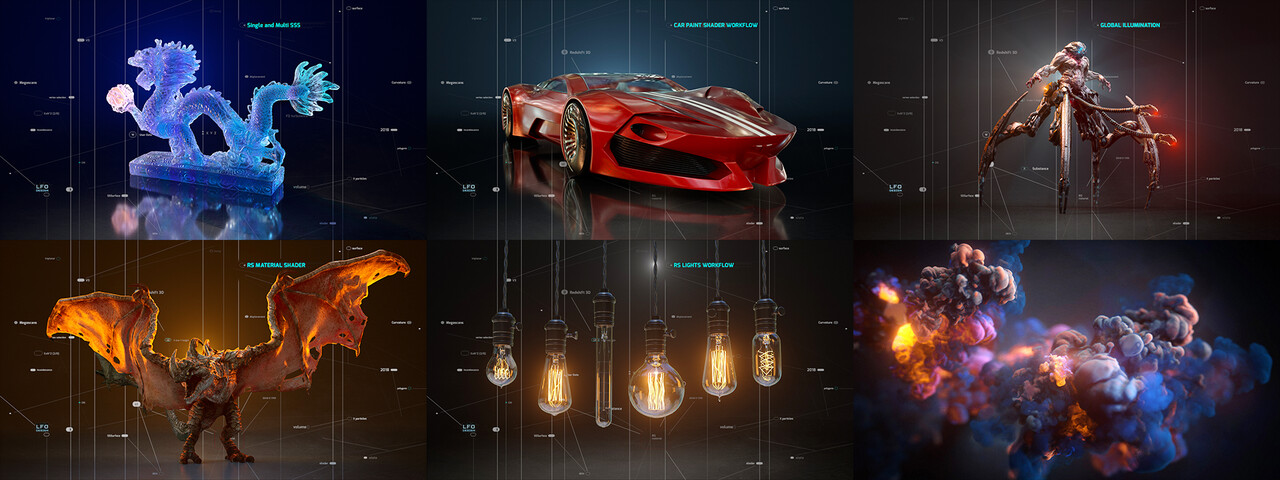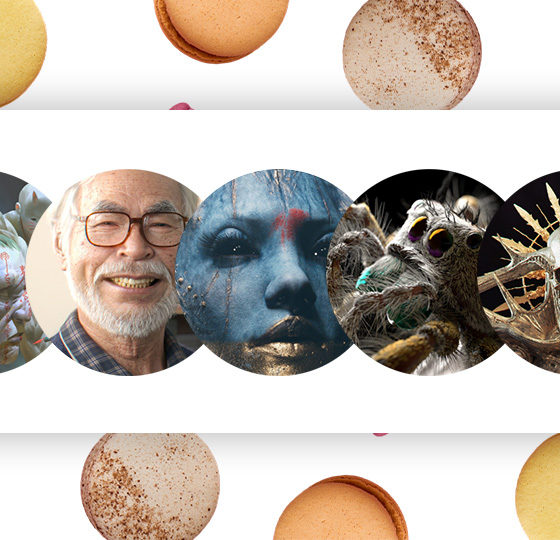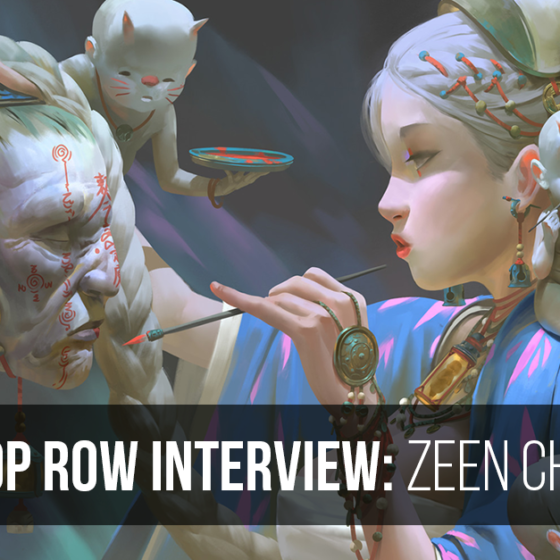Lead/Senior VFX artist with more than 19 years of experience. Roland has worked on movies such as Star Wars, Avengers, Transformers, Warcraft, Interstellar, Gravity, Iron Man, Thor, Ready Player One, Aquaman, Bumblebee and many more.

INTRODUCTION
I started my career as a VFX artist at UPP Prague 2002. Everything was new and interesting for me, so I was very excited. I was with UPP for 7 years and they have given me a lot of opportunities to prove my worth to the team such as working on commercials, vfx movies or later even leading entire movie sequences . For that, I am very grateful to people who helped me really a lot in the past to become a successful vfx artist.
After UPP, I was working in prestigious VFX production companies such as Framestore London, Double Negative London, RSP Australia, Scanline Germany and Lucasfilm Singapore. All these studios are awesome and I had a great time with many memories. Currently, I’m working as a VFX Mentor for LFO design production company.

Could you tell us some of the interesting projects you’ve worked on?
Alien vs Predator – UPP
Gravity, Ironman 3 – Framestore
Interstellar, Thor 2 – DNEG
Wolverine – RSP
Avengers 2+3, Warcraft, Star wars 8, SW Rogue one, Transformers 5, Bumblebee , Aquaman, Ready Player One – ILM

Can you tell us some info about your current project?
Currently, I’m working on updating Redshift 3D Rendering course content. Link: https://lfodesign.com/redshift/
We’ve spent 2 years creating an online rendering course for beginners and intermediate level users. Recently, Redshift launched new powerful features such as ACES color management. We are now working on updates to cover all important details and techniques for all our students.
So currently you are focusing on Online VFX courses?
Yes, I put my entire time and effort into building the most comprehensive Online VFX course in the market as we are dedicated to imparting our knowledge to people who are keen to embark their journey in the motion design and VFX industry. To date, we have more than 700 students worldwide, so currently it’s my full time job.

CREATIVE PROCESS
What software and tools do you use for your work, and why?
I use these tools mainly because it’s an industry standard:
– Nuke for Compositing
– Substance and Quixel for texturing
– Photoshop for photo editing and Davinci Resolve for Grading.
My favorite tools:
– Cinema 4D for CG, because it’s a very user-friendly DCC.
– Redshift renderer, because it’s the fastest GPU-based renderer, and I’m even able to render on just 1PC in heavy scenes.
– Gaea Terrain generator
I’ve been exploring these few tools a lot lately:
– X-particles, because I like to play with simulations.
– FumeFX, FD Turbulence, Embergen for fluid simulation.
Lastly, when I have some time to spare, I will play around with Zbrush just for relax.

How do you organize your day (how many hours do you work per day)?
If I’m working for some studio it’s usually 8 hours per day and 5 days per week. If I’m working on large scale projects like now as a mentor in LFO Design, it’s usually 12 hours per day and 6 days per week.
How important is work with reference for you? Do you have any tips on how to effectively organize an extensive reference library?
I think that reference are very important for artists. For work, I mainly use 3d.sk network references as they have the largest database worldwide, very affordable and high quality references.

For inspiration, I am using Artstation. Lastly, to build photorealistic renders, I mainly hone my skills by taking more photos and comparing it with my renders to make it as realistic as possible.
Could you describe some of your creative workflow/pipeline for us?
This is a topic where I am able to talk for hours. That’s the main reason why we are working on the entire VFX courses. If you would like to know more about my techniques or workflow, please visit our youtube channel, there’s a bunch of free tutorials over there:
Link: https://www.youtube.com/channel/UCICX-1CM1FBXWRTqB42Rzwg/videos
What drill routine do you use to sharpen your skills?
Tutorials , Practise – personal projects, Work – challenging projects.

ART COMMUNITY
What is your favourite art genre?
Definitely Sci-fi and Fantasy.
What project/movie are you most proud of?
– Movie Gravity because it was my 1st show in London and I had the opportunity to work on very unique show.
– Movie Interstellar because it was the 1st time where I have responsibility for the entire movie sequence.
These 2 movies have also won Oscar and BAFTA awards in the best VFX category of the year.
Lastly, I am also very proud of the Redshift 3D course, where I put 100% of my time and effort into creating the course, sharing all my skills and techniques which I’ve acquired over the last 20 years of my VFX career.

Does the VFX industry offer enough opportunities?
Definitely yes. I never had a problem finding work on interesting projects.
How do you define success as an artist?
If you are able to create an art which is appreciated by at least 1 person, you are already a successful artist. Everything else is just a matter of ambitions.
How do you communicate with your students?
I have a private facebook group where I’m providing feedback and updates constantly to my students.

PROMOTION & FEEDBACK
Who provides you the most relevant feedback?
If I’m working for a studio, the VFX supervisors will give relevant feedback on how to improve my work to meet the client’s requirements. As for my personal project at LFO Design, my students are constantly giving me feedback on what they would like to learn next in the course.
What social channels do you use for communication with your followers?
Facebook, Youtube, Instagram.
Part of the creative process is also a failure, how do you deal with it?
Staying Motivated and a lot of practice is the key. You have to understand that the creative process needs patience and time. So, sometimes when you hit a roadblock, don’t force yourself too much. Just take a short break and relax. You will be surprised that the results can be better than you expected. Also, if you work hard and keep trying to improve yourselves, you will be able to achieve the result no matter what.
MENTORSHIP
What’s the best advice you would give your younger self?
Work hard and stay focused on your goals and dreams. But, don’t forget to enjoy your life as well. Travel more and explore the world. Don’t be afraid to take on new opportunities and challenges as these will make you a better person in all aspects of life.

What 3 movies are a must for VFX artists?
Blade runner, Lord of the Rings saga, Star wars saga
Can you give a starter tip for a 3D beginner?
If your field of interest is VFX, compositing or 3D lighting/rendering, I will definitely recommend you to start with a proper course which can teach you correct techniques. The current trend I see is that people are learning from youtubers which are very often showing incorrect techniques and provide wrong informations. And for many beginners this resulted in their inability to cope in professional studios as they struggled a lot on using tools properly. My advice is always learn from people who have at least 10 years of experience from professional studios.

If you mentored younger artists who are beginning their art careers, what is the single most important piece of advice would you offer?
A lot of practice. My entire Redshift course is built in such a way where you have to build your own scenes and practice a lot. I’m sharing with them just a few of my scenes in the last part of my course. Again, the reason is simple; we want them to be able to build their own version of scenes.
The typical trend is that if you buy a CG course, you will find their final scenes and assets, which is one of the biggest mistakes for a beginner artist to have access to these completely done scenes. If you have access to the final result, you will never learn how to build it from scratch, or what steps to do if scenes contain different kinds of assets. So later, when you need to work on some professional projects, you will actually realise that you have no idea how to do it.
What’s the point of having a CG course where hundreds of my students will render my work instead of learning how to render their own work? And, that’s the reason why I chose a different path for our students. So far it works very well because many of our students in a relatively short period of time are able to create very good-looking results from their own assets. That’s the most important step for their career, being able to build your own work by yourselves.

What is the most common mistake your students make?
Lack of practice. You have to understand that if you want to be successful, you need to have correct information on understanding techniques or how tools work. That is something that you can only learn in a paid CG course. But, what you cannot buy is experience. You can only accumulate experience when you practice a lot. Very often, people think that after 1 week of learning, they will be able to work in Lucasfilm on Star wars. But, the reality is that only artists who have years of experience will have a higher chance to join big production companies. It means that the more you practice, the faster you will achieve your goals.
I strongly believe that you have to put in a lot of effort in every field. Success without hard work does not exist.

RELAX
How do you manage a work-life balance as an artist?
Having strong passion and motivation helps to push myself to work hard. But, it is also important to find time to enjoy life so that you don’t find your work a mundane chore.
For example, I always have some plan or vision of what my next goal is. When I achieve it, I always treat myself with an awesome vacation, or buy myself something that will make me happy. So as you can see, I’m very motivated to achieve all my goals. If you are tired and you want to give up, always think of your goals and rewards, it’s a great way to motivate yourself. Olympic medalists train for 4 years to be ready for their main event. But once they are successful, the entire world remembers them. If your mindset is able to work the same way, you can reach the stars 🙂
What’s the best thing about being an artist?
Freedom, Creativity and opportunity to express all my feelings or vision through art..













